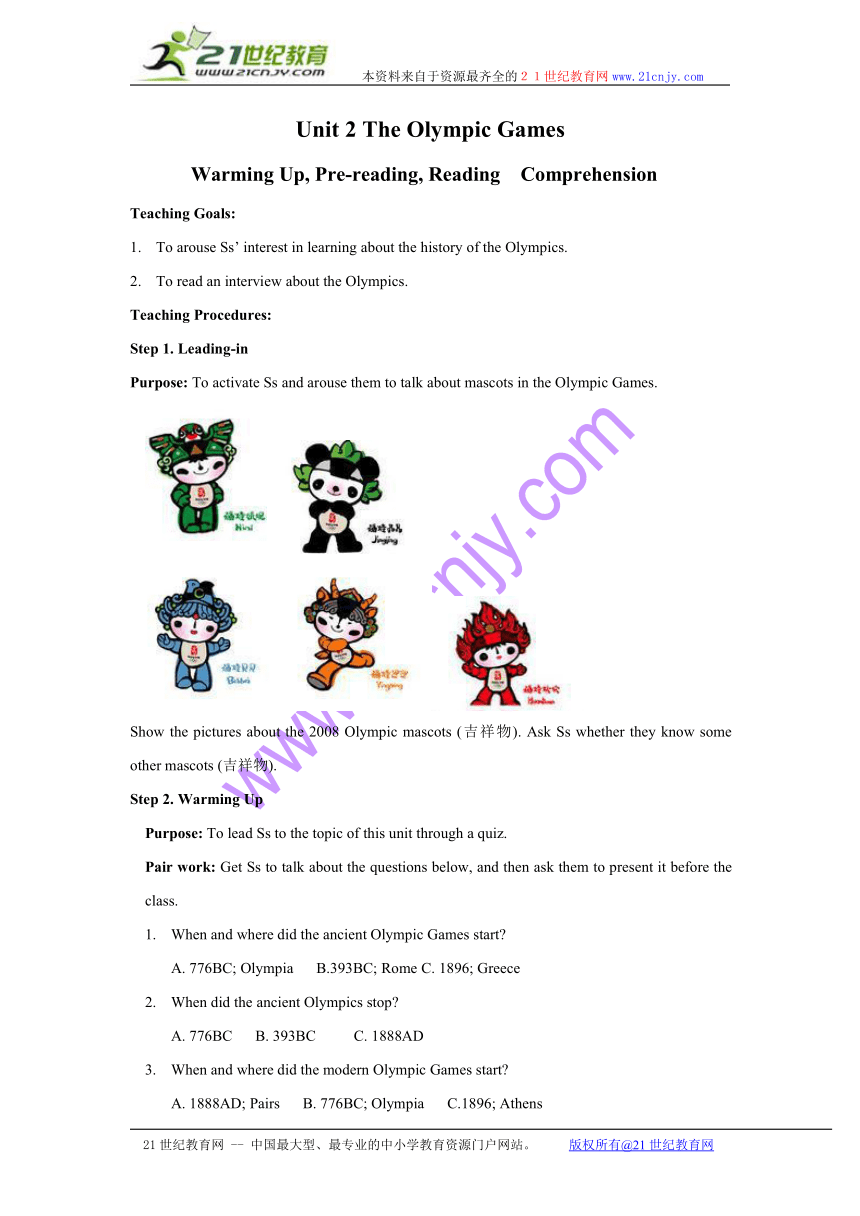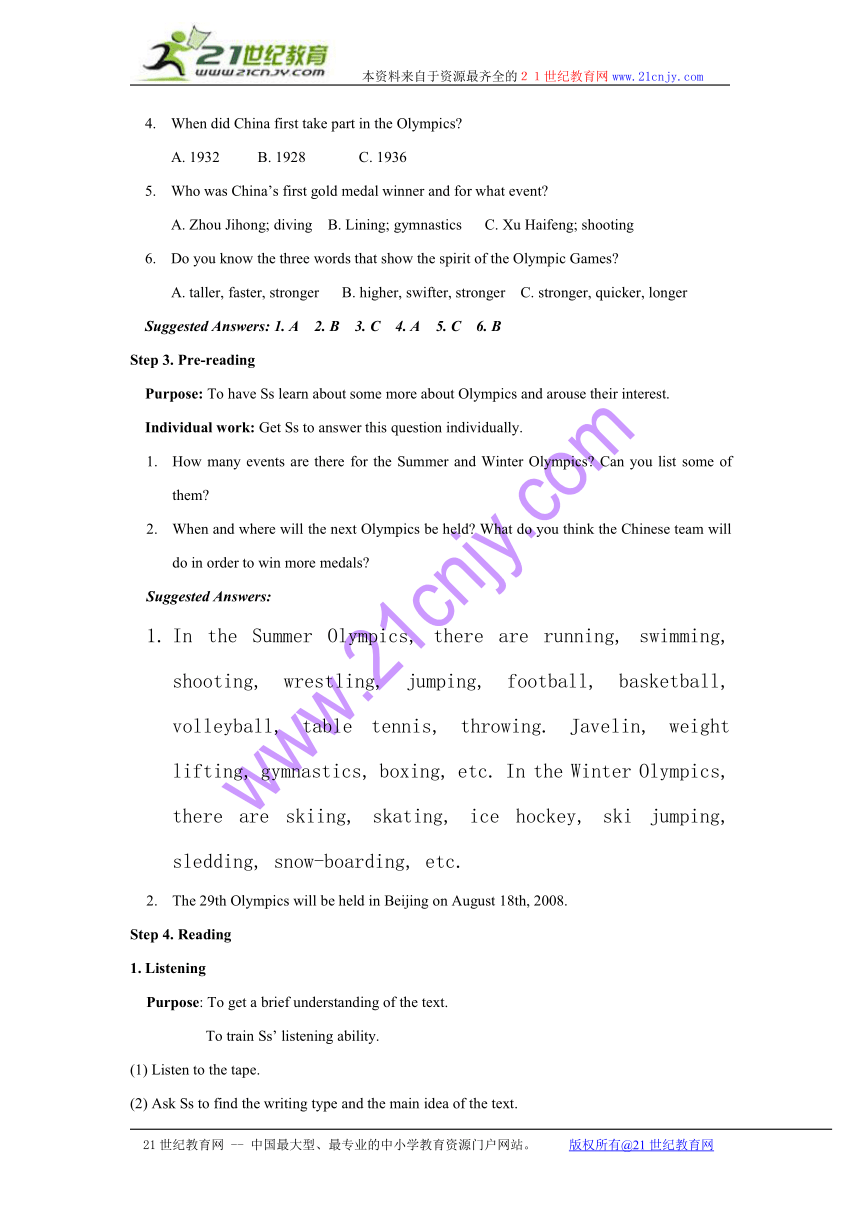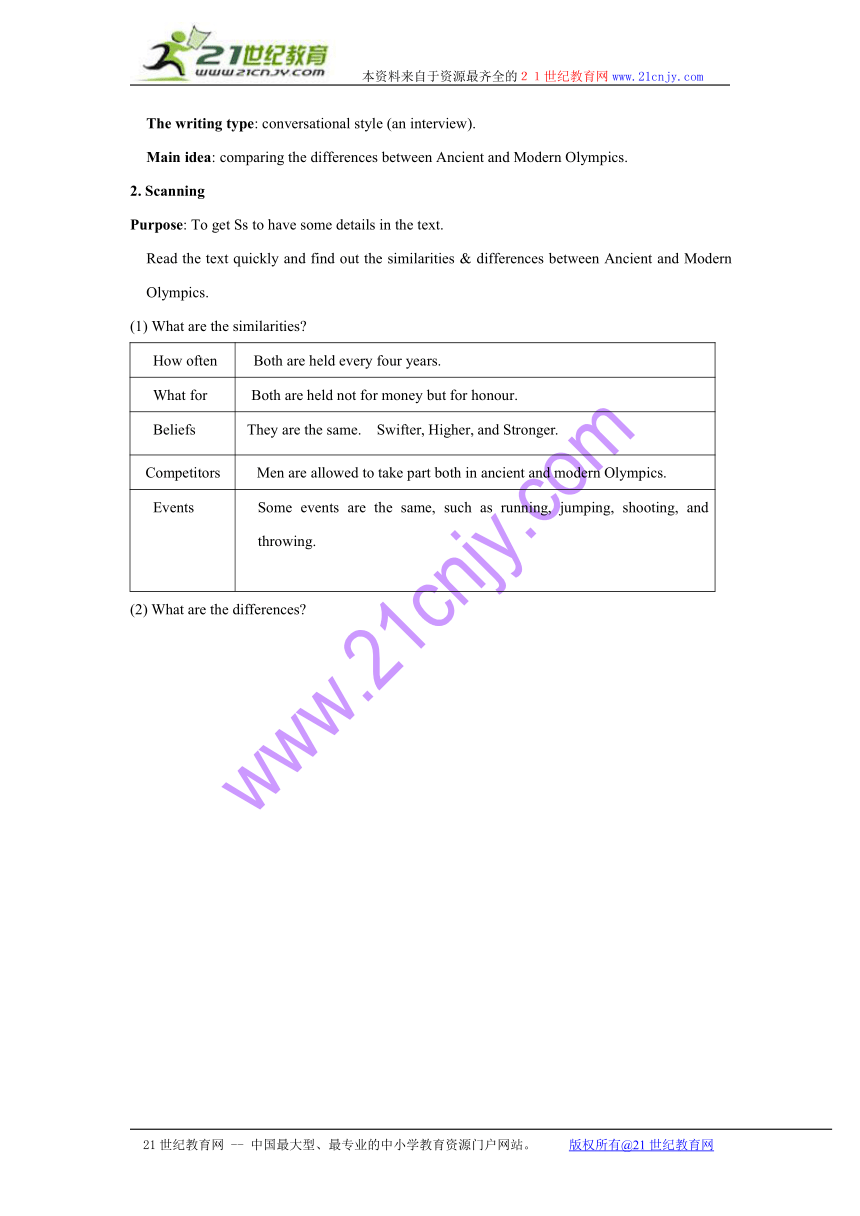Unit 2 The Olympic Games Warming Up, Pre-reading, Reading Comprehension 教案(新人教版必修2)
文档属性
| 名称 | Unit 2 The Olympic Games Warming Up, Pre-reading, Reading Comprehension 教案(新人教版必修2) |

|
|
| 格式 | rar | ||
| 文件大小 | 41.2KB | ||
| 资源类型 | 教案 | ||
| 版本资源 | 人教版(新课程标准) | ||
| 科目 | 英语 | ||
| 更新时间 | 2009-07-15 00:00:00 | ||
图片预览



文档简介
本资料来自于资源最齐全的21世纪教育网www.21cnjy.com
Unit 2 The Olympic Games
Warming Up, Pre-reading, Reading Comprehension
Teaching Goals:
1. To arouse Ss’ interest in learning about the history of the Olympics.
2. To read an interview about the Olympics.
Teaching Procedures:
Step 1. Leading-in
Purpose: To activate Ss and arouse them to talk about mascots in the Olympic Games.
HYPERLINK "http://image./i ct=503316480&z=504785400&tn=baiduimagedetail&word=北京奥运吉祥物&in=71" \t "_blank" HYPERLINK "http://image./i ct=503316480&z=31032250&tn=baiduimagedetail&word=北京奥运吉祥物&in=133" \t "_blank"
Show the pictures about the 2008 Olympic mascots (吉祥物). Ask Ss whether they know some other mascots (吉祥物).
Step 2. Warming Up
Purpose: To lead Ss to the topic of this unit through a quiz.
Pair work: Get Ss to talk about the questions below, and then ask them to present it before the class.
1. When and where did the ancient Olympic Games start
A. 776BC; Olympia B.393BC; Rome C. 1896; Greece
2. When did the ancient Olympics stop
A. 776BC B. 393BC C. 1888AD
3. When and where did the modern Olympic Games start
A. 1888AD; Pairs B. 776BC; Olympia C.1896; Athens
4. When did China first take part in the Olympics
A. 1932 B. 1928 C. 1936
5. Who was China’s first gold medal winner and for what event
A. Zhou Jihong; diving B. Lining; gymnastics C. Xu Haifeng; shooting
6. Do you know the three words that show the spirit of the Olympic Games
A. taller, faster, stronger B. higher, swifter, stronger C. stronger, quicker, longer
Suggested Answers: 1. A 2. B 3. C 4. A 5. C 6. B
Step 3. Pre-reading
Purpose: To have Ss learn about some more about Olympics and arouse their interest.
Individual work: Get Ss to answer this question individually.
1. How many events are there for the Summer and Winter Olympics Can you list some of them
2. When and where will the next Olympics be held What do you think the Chinese team will do in order to win more medals
Suggested Answers:
1. In the Summer Olympics, there are running, swimming, shooting, wrestling, jumping, football, basketball, volleyball, table tennis, throwing. Javelin, weight lifting, gymnastics, boxing, etc. In the Winter Olympics, there are skiing, skating, ice hockey, ski jumping, sledding, snow-boarding, etc.
2. The 29th Olympics will be held in Beijing on August 18th, 2008.
Step 4. Reading
1. Listening
Purpose: To get a brief understanding of the text.
To train Ss’ listening ability.
(1) Listen to the tape.
(2) Ask Ss to find the writing type and the main idea of the text.
The writing type: conversational style (an interview).
Main idea: comparing the differences between Ancient and Modern Olympics.
2. Scanning
Purpose: To get Ss to have some details in the text.
Read the text quickly and find out the similarities & differences between Ancient and Modern Olympics.
(1) What are the similarities
How often Both are held every four years.
What for Both are held not for money but for honour.
Beliefs They are the same. Swifter, Higher, and Stronger.
Competitors Men are allowed to take part both in ancient and modern Olympics.
Events Some events are the same, such as running, jumping, shooting, and throwing.
(2) What are the differences
Ancient Modern
Games Summer Summer & winter
Country Only Greece Countries from all over the world
Competitors Only men Men and women
Prize Olive wreath Medal
Events A few Many more
3. Read the passage carefully and silently and finish Ex2 (P11).
Suggested Answers:
(1) Pausanias is amazed that many countries take part in the Olympic Games and women too and there are two sets of Games-the Winter and the Summer Olympics.
(2) Because Li Yan has explained that it is a great honour to host the Olympic Games..
(3)He thinks that so many things have changed in the Olympic Games that he fears that the spirit of the Olympics may have changed too.
4.Discussion
You know our government has tried its best to compete for hosting the 29th Olympic games. It has cost a lot of money. Do you think it is worthwhile Why
For your reference:
It is worthwhile to host the Olympic games. To host Olympic Games can make our culture and people understood by the other peoples. To host Olympic Games can make our country known to the whole world. To host Olympic Games can stimulate our economy, and help to speed up its development.
5. Imagination
Imagine what we will do and what we can do for the 29th Olympic Games.
For your reference:
Maybe we can serve as volunteers to help the foreign visitors and athletes from all over the world. So at present we should study hard. Especially we should try our best to learn English well.
6. Summary
As we have finished the passage we’ll sum up what we have learned. First let’s see the writing skills. It is written in a conversational style. It’s in a very interesting way. It adopts a dialogue between Pausanias who lived 2000 years ago and a Chinese gird in modern world. Through their dialogue, the differences and similarities between the ancient and modern Olympic Games are made known to the readers. Just because it is in a conversational style, there are quite a few oral spoken English and elliptical phrases.
Through the comparison between the ancient and modern Olympic Games, we have learned the differences and the similarities between them. Now we can have a deep understanding of the Games. From the passage, we can have a deep understanding of the Games. From the passage, we can also get to know that the Olympic Games are developing and improving. It’s our duty to make the Olympic Games better and healthier. We know that one of the slogans for 2008 Beijing Olympic Games is Green Olympic Games. It shows that people are paying more and more attention to our environment.
7. Language points
Purpose: To train Ss’ language capacity.
Divide Ss into four groups and ask each group to discuss how to understand and use the new words and analyze the following phrases. Give Ss enough time to learn the language points by heart.
take part in…, in order to, find out, used to, be admitted as…, compete against…, for the honour of…, be admitted to…, play a role, as well as, , as a matter of fact, compete for…, proud of…,
8. Retelling
Purpose: Train students’ ability of summarizing and expressing.
We can see the text is written in a conversational style. And there are two speakers. One is Pausanias, a Greek writer 2000 years ago, the other is Li Li, a Chinese girl. Now let’s change it into a narrative style. In other words, let’s describe the ancient and modern Olympic Games in our own words. Who would like to have a try
For your reference:
The ancient Olympic Games began in Greece and were held from 776 BC to AD393. It was held every four years. At that time, there were not so many sports as today. And women were not allowed to take part in the games. There were not Winter Olympics at that time. Winners got the olive wreath as the prize. The motto was swifter, higher and stronger.
The modern Olympic Games began in 1891. They’re held every four years. There are many new sports in the Olympics. In the summer Olympics there are over 250 different sports. Women are not only allowed to join in but also play a very important role. Now the competitors compete for medals. The motto is swifter, higher and stronger.
Winners got the olive wreath as the prize. The motto was swifter, higher and stronger.
The modern Olympic Games began in 1891. They’re held every four years. There are many new sports in the Olympics. In the summer Olympics there are over 250 different sports. Women are not only allowed to join in but also play a very important role. Now the competitors compete for medals. The motto is swifter, higher and stronger.
高考资源网
21世纪教育网 -- 中国最大型、最专业的中小学教育资源门户网站。 版权所有@21世纪教育网
Unit 2 The Olympic Games
Warming Up, Pre-reading, Reading Comprehension
Teaching Goals:
1. To arouse Ss’ interest in learning about the history of the Olympics.
2. To read an interview about the Olympics.
Teaching Procedures:
Step 1. Leading-in
Purpose: To activate Ss and arouse them to talk about mascots in the Olympic Games.
HYPERLINK "http://image./i ct=503316480&z=504785400&tn=baiduimagedetail&word=北京奥运吉祥物&in=71" \t "_blank" HYPERLINK "http://image./i ct=503316480&z=31032250&tn=baiduimagedetail&word=北京奥运吉祥物&in=133" \t "_blank"
Show the pictures about the 2008 Olympic mascots (吉祥物). Ask Ss whether they know some other mascots (吉祥物).
Step 2. Warming Up
Purpose: To lead Ss to the topic of this unit through a quiz.
Pair work: Get Ss to talk about the questions below, and then ask them to present it before the class.
1. When and where did the ancient Olympic Games start
A. 776BC; Olympia B.393BC; Rome C. 1896; Greece
2. When did the ancient Olympics stop
A. 776BC B. 393BC C. 1888AD
3. When and where did the modern Olympic Games start
A. 1888AD; Pairs B. 776BC; Olympia C.1896; Athens
4. When did China first take part in the Olympics
A. 1932 B. 1928 C. 1936
5. Who was China’s first gold medal winner and for what event
A. Zhou Jihong; diving B. Lining; gymnastics C. Xu Haifeng; shooting
6. Do you know the three words that show the spirit of the Olympic Games
A. taller, faster, stronger B. higher, swifter, stronger C. stronger, quicker, longer
Suggested Answers: 1. A 2. B 3. C 4. A 5. C 6. B
Step 3. Pre-reading
Purpose: To have Ss learn about some more about Olympics and arouse their interest.
Individual work: Get Ss to answer this question individually.
1. How many events are there for the Summer and Winter Olympics Can you list some of them
2. When and where will the next Olympics be held What do you think the Chinese team will do in order to win more medals
Suggested Answers:
1. In the Summer Olympics, there are running, swimming, shooting, wrestling, jumping, football, basketball, volleyball, table tennis, throwing. Javelin, weight lifting, gymnastics, boxing, etc. In the Winter Olympics, there are skiing, skating, ice hockey, ski jumping, sledding, snow-boarding, etc.
2. The 29th Olympics will be held in Beijing on August 18th, 2008.
Step 4. Reading
1. Listening
Purpose: To get a brief understanding of the text.
To train Ss’ listening ability.
(1) Listen to the tape.
(2) Ask Ss to find the writing type and the main idea of the text.
The writing type: conversational style (an interview).
Main idea: comparing the differences between Ancient and Modern Olympics.
2. Scanning
Purpose: To get Ss to have some details in the text.
Read the text quickly and find out the similarities & differences between Ancient and Modern Olympics.
(1) What are the similarities
How often Both are held every four years.
What for Both are held not for money but for honour.
Beliefs They are the same. Swifter, Higher, and Stronger.
Competitors Men are allowed to take part both in ancient and modern Olympics.
Events Some events are the same, such as running, jumping, shooting, and throwing.
(2) What are the differences
Ancient Modern
Games Summer Summer & winter
Country Only Greece Countries from all over the world
Competitors Only men Men and women
Prize Olive wreath Medal
Events A few Many more
3. Read the passage carefully and silently and finish Ex2 (P11).
Suggested Answers:
(1) Pausanias is amazed that many countries take part in the Olympic Games and women too and there are two sets of Games-the Winter and the Summer Olympics.
(2) Because Li Yan has explained that it is a great honour to host the Olympic Games..
(3)He thinks that so many things have changed in the Olympic Games that he fears that the spirit of the Olympics may have changed too.
4.Discussion
You know our government has tried its best to compete for hosting the 29th Olympic games. It has cost a lot of money. Do you think it is worthwhile Why
For your reference:
It is worthwhile to host the Olympic games. To host Olympic Games can make our culture and people understood by the other peoples. To host Olympic Games can make our country known to the whole world. To host Olympic Games can stimulate our economy, and help to speed up its development.
5. Imagination
Imagine what we will do and what we can do for the 29th Olympic Games.
For your reference:
Maybe we can serve as volunteers to help the foreign visitors and athletes from all over the world. So at present we should study hard. Especially we should try our best to learn English well.
6. Summary
As we have finished the passage we’ll sum up what we have learned. First let’s see the writing skills. It is written in a conversational style. It’s in a very interesting way. It adopts a dialogue between Pausanias who lived 2000 years ago and a Chinese gird in modern world. Through their dialogue, the differences and similarities between the ancient and modern Olympic Games are made known to the readers. Just because it is in a conversational style, there are quite a few oral spoken English and elliptical phrases.
Through the comparison between the ancient and modern Olympic Games, we have learned the differences and the similarities between them. Now we can have a deep understanding of the Games. From the passage, we can have a deep understanding of the Games. From the passage, we can also get to know that the Olympic Games are developing and improving. It’s our duty to make the Olympic Games better and healthier. We know that one of the slogans for 2008 Beijing Olympic Games is Green Olympic Games. It shows that people are paying more and more attention to our environment.
7. Language points
Purpose: To train Ss’ language capacity.
Divide Ss into four groups and ask each group to discuss how to understand and use the new words and analyze the following phrases. Give Ss enough time to learn the language points by heart.
take part in…, in order to, find out, used to, be admitted as…, compete against…, for the honour of…, be admitted to…, play a role, as well as, , as a matter of fact, compete for…, proud of…,
8. Retelling
Purpose: Train students’ ability of summarizing and expressing.
We can see the text is written in a conversational style. And there are two speakers. One is Pausanias, a Greek writer 2000 years ago, the other is Li Li, a Chinese girl. Now let’s change it into a narrative style. In other words, let’s describe the ancient and modern Olympic Games in our own words. Who would like to have a try
For your reference:
The ancient Olympic Games began in Greece and were held from 776 BC to AD393. It was held every four years. At that time, there were not so many sports as today. And women were not allowed to take part in the games. There were not Winter Olympics at that time. Winners got the olive wreath as the prize. The motto was swifter, higher and stronger.
The modern Olympic Games began in 1891. They’re held every four years. There are many new sports in the Olympics. In the summer Olympics there are over 250 different sports. Women are not only allowed to join in but also play a very important role. Now the competitors compete for medals. The motto is swifter, higher and stronger.
Winners got the olive wreath as the prize. The motto was swifter, higher and stronger.
The modern Olympic Games began in 1891. They’re held every four years. There are many new sports in the Olympics. In the summer Olympics there are over 250 different sports. Women are not only allowed to join in but also play a very important role. Now the competitors compete for medals. The motto is swifter, higher and stronger.
高考资源网
21世纪教育网 -- 中国最大型、最专业的中小学教育资源门户网站。 版权所有@21世纪教育网
